30 apr 2019
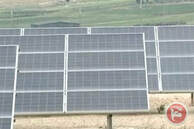
Israeli authorities delivered a stop-construction notice to solar panels, in the northern Jordan Valley, in the occupied West Bank, ordering halt of construction, on Monday.
Mutaz Bisharat, a Palestinian official in charge of Jordan Valley's Israeli settlements file at the Palestinian Authority (PA), said that the Israeli authorities raided the area and delivered a stop-construction notice to solar panels used for providing electricity to Palestinian residents.
Bisharat added that the solar panels were supplied through NGO humanitarian projects.
Forming a third of the occupied West Bank and with 88 percent of its land classified as Area C, the Jordan Valley has long been a strategic area of land unlikely to return to Palestinians following Israel's occupation in 1967.
Mutaz Bisharat, a Palestinian official in charge of Jordan Valley's Israeli settlements file at the Palestinian Authority (PA), said that the Israeli authorities raided the area and delivered a stop-construction notice to solar panels used for providing electricity to Palestinian residents.
Bisharat added that the solar panels were supplied through NGO humanitarian projects.
Forming a third of the occupied West Bank and with 88 percent of its land classified as Area C, the Jordan Valley has long been a strategic area of land unlikely to return to Palestinians following Israel's occupation in 1967.

The Palestinian Authority’s programme, “Private Sector Reconstruction Gaza – Agriculture,” is providing an integrated package of support to Palestinian farmers in the Gaza Strip.
This EU-funded programme is helping Palestinian farmers, throughout the Gaza Strip, affected by the Israeli occupation, in restoring their businesses.
The new contribution of €3.7 million targets 178 additional farmers and agro-businesses to relaunch, repair or replace damaged businesses. It covers wide range of activities including the acquisition of agricultural supplies, rehabilitation of land and other small infrastructure works. In particular, the Palestinian Authority will rehabilitate 22 water wells, to irrigate about 2800 dunams, supply 15 agricultural tractors, provide 118 livestock farms, including 2,600 heads of livestock, and construct 37 greenhouses units.
This brings the total number of beneficiaries of the programme, to date, to 259 farmers.
”Agricultural production is a crucial sector of the Palestinian economy. The support to the agricultural sector is essential to build a future Palestinian State with a viable economy. In this context, the EU contributes to programmes run by the Palestinian Authority to sustain the livelihoods of people and further strengthen the Palestinian agro-businesses.
The Gaza Strip has a strong agricultural potential and the farmers there have suffered from the consequences of multiple conflicts since 2008. This programme will allow hundreds of them to restore their agricultural businesses and improve their lives,” said the Deputy EU Representative Tomas Niklasson, according to the PNN.
The overall financial envelope of the Private Sector Reconstruction Gaza – Agriculture (PSRG-A) programme amounts to €10.5 million. It is expected to serve about 400 eligible beneficiaries in the Gaza Strip. The programme was designed and is managed by the Palestinian Ministry of Agriculture and the Palestinian Agriculture Disaster Risk Reduction and Insurance Fund.
The payments are made by the Palestinian Authority’s Ministry of Finance and Planning through a network of local banks.
This EU-funded programme is helping Palestinian farmers, throughout the Gaza Strip, affected by the Israeli occupation, in restoring their businesses.
The new contribution of €3.7 million targets 178 additional farmers and agro-businesses to relaunch, repair or replace damaged businesses. It covers wide range of activities including the acquisition of agricultural supplies, rehabilitation of land and other small infrastructure works. In particular, the Palestinian Authority will rehabilitate 22 water wells, to irrigate about 2800 dunams, supply 15 agricultural tractors, provide 118 livestock farms, including 2,600 heads of livestock, and construct 37 greenhouses units.
This brings the total number of beneficiaries of the programme, to date, to 259 farmers.
”Agricultural production is a crucial sector of the Palestinian economy. The support to the agricultural sector is essential to build a future Palestinian State with a viable economy. In this context, the EU contributes to programmes run by the Palestinian Authority to sustain the livelihoods of people and further strengthen the Palestinian agro-businesses.
The Gaza Strip has a strong agricultural potential and the farmers there have suffered from the consequences of multiple conflicts since 2008. This programme will allow hundreds of them to restore their agricultural businesses and improve their lives,” said the Deputy EU Representative Tomas Niklasson, according to the PNN.
The overall financial envelope of the Private Sector Reconstruction Gaza – Agriculture (PSRG-A) programme amounts to €10.5 million. It is expected to serve about 400 eligible beneficiaries in the Gaza Strip. The programme was designed and is managed by the Palestinian Ministry of Agriculture and the Palestinian Agriculture Disaster Risk Reduction and Insurance Fund.
The payments are made by the Palestinian Authority’s Ministry of Finance and Planning through a network of local banks.
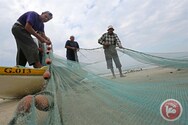
Israeli authorities backtracked on a recent decision and decided, on Tuesday, to reduce the permitted fishing zone in the besieged Gaza Strip from 15 nautical miles to only six.
Head of the Palestinian Fishermen Union in Gaza, Zakariya Bakr, told Ma'an that Israeli authorities reduced the permitted fishing zone to six nautical miles.
Bakr added that Israeli authorities ordered Israeli naval forces to remove and destroy Palestinian fishing nets nine nautical miles off Gaza’s coast.
The Israeli navy also chased Palestinian fishermen back to shore, undermining their ability to make a living at sea.
The reason for the reduction remained unknown.
It is noteworthy that at the beginning of April, Israeli authorities allowed the expansion of the permitted fishing zone off Gaza’s coast as part of the Egypt-mediated ceasefire agreement between the Hamas movement and Israel.
The Israeli decision was supposed to allow the expansion of the fishing zone to 15 nautical miles.
Palestinian fishermen, who try to make a living off the shores of the blockaded coastal enclave face daily risks, including routine harassment from Israeli naval forces, confiscation of boats and materials, detention and live fire.
Local rights organization, Al-Haq, has documented many cases of Israeli aggression toward Palestinian fishermen off the Gazan coast, calling the Israel's action against the fishermen "collective punishment" that imposes "difficult economic and social conditions."
According to the United Nations Office for Humanitarian Affairs (OCHA), in 1994, a permitted fishing range of 20 nautical miles was agreed on between Israel and the Palestinian Liberation Organization (PLO). In practice, Israel only allowed fishing up to 12 nautical miles until 2006, when the fishing zone was reduced to six and later to three.
Head of the Palestinian Fishermen Union in Gaza, Zakariya Bakr, told Ma'an that Israeli authorities reduced the permitted fishing zone to six nautical miles.
Bakr added that Israeli authorities ordered Israeli naval forces to remove and destroy Palestinian fishing nets nine nautical miles off Gaza’s coast.
The Israeli navy also chased Palestinian fishermen back to shore, undermining their ability to make a living at sea.
The reason for the reduction remained unknown.
It is noteworthy that at the beginning of April, Israeli authorities allowed the expansion of the permitted fishing zone off Gaza’s coast as part of the Egypt-mediated ceasefire agreement between the Hamas movement and Israel.
The Israeli decision was supposed to allow the expansion of the fishing zone to 15 nautical miles.
Palestinian fishermen, who try to make a living off the shores of the blockaded coastal enclave face daily risks, including routine harassment from Israeli naval forces, confiscation of boats and materials, detention and live fire.
Local rights organization, Al-Haq, has documented many cases of Israeli aggression toward Palestinian fishermen off the Gazan coast, calling the Israel's action against the fishermen "collective punishment" that imposes "difficult economic and social conditions."
According to the United Nations Office for Humanitarian Affairs (OCHA), in 1994, a permitted fishing range of 20 nautical miles was agreed on between Israel and the Palestinian Liberation Organization (PLO). In practice, Israel only allowed fishing up to 12 nautical miles until 2006, when the fishing zone was reduced to six and later to three.
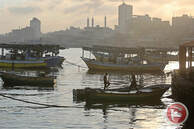
A Palestinian fisherman was shot and injured with a rubber-coated steel bullet fired by Israeli naval forces while working off Gaza’s coast, on Tuesday.
According to the Palestinian Fishermen Union in Gaza, Amran Muhammad Bakr was shot and injured during an attack by Israeli naval forces while working off the coast of Gaza.
Sources confirmed that Bakr was shot and injured in the back with a rubber-coated steel bullet.
However, his medical condition remained unknown.
The Israeli army also regularly detains and opens fire on unarmed Palestinian fishermen, shepherds, and farmers along the border areas if they approach the buffer zone, as the authorities have not made clear the precise area of the designated zone.
The practice has in effect destroyed much of the agricultural and fishing sector of the blockaded coastal enclave, which has been under an Israeli air, land, and sea blockade for 12 years.
Israeli human rights group B'Tselem recently concluded that Israel's Gaza closure and "harassment of fishermen" have been "destroying Gaza's fishing sector," with 95 percent of fishermen living below the poverty line.
According to the Palestinian Fishermen Union in Gaza, Amran Muhammad Bakr was shot and injured during an attack by Israeli naval forces while working off the coast of Gaza.
Sources confirmed that Bakr was shot and injured in the back with a rubber-coated steel bullet.
However, his medical condition remained unknown.
The Israeli army also regularly detains and opens fire on unarmed Palestinian fishermen, shepherds, and farmers along the border areas if they approach the buffer zone, as the authorities have not made clear the precise area of the designated zone.
The practice has in effect destroyed much of the agricultural and fishing sector of the blockaded coastal enclave, which has been under an Israeli air, land, and sea blockade for 12 years.
Israeli human rights group B'Tselem recently concluded that Israel's Gaza closure and "harassment of fishermen" have been "destroying Gaza's fishing sector," with 95 percent of fishermen living below the poverty line.
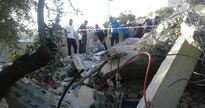
The Israeli authorities on Monday demolished several Palestinian facilities in Occupied Jerusalem for allegedly being unlicensed.
Wadi Hilweh Information Center reported that the Israeli-controlled Jerusalem municipality demolished 25 residential and agricultural structures in the towns of Silwan, Sur Baher, and Jabal al-Mukabber.
Wadi Hilweh said that Israeli bulldozers demolished mobile houses, stores, sheep barns, and different agricultural facilities privately-owned by Palestinian citizens in Jabal al-Mukabber.
In Sur Baher, the Israeli municipality forced a Palestinian citizen to demolish his own home, and destroyed a sheep barn.
Meanwhile in Silwan, according to Wadi Hilweh, Israeli bulldozers demolished a parking lot in al-Thawri neighborhood.
Wadi Hilweh Information Center reported that the Israeli-controlled Jerusalem municipality demolished 25 residential and agricultural structures in the towns of Silwan, Sur Baher, and Jabal al-Mukabber.
Wadi Hilweh said that Israeli bulldozers demolished mobile houses, stores, sheep barns, and different agricultural facilities privately-owned by Palestinian citizens in Jabal al-Mukabber.
In Sur Baher, the Israeli municipality forced a Palestinian citizen to demolish his own home, and destroyed a sheep barn.
Meanwhile in Silwan, according to Wadi Hilweh, Israeli bulldozers demolished a parking lot in al-Thawri neighborhood.
29 apr 2019
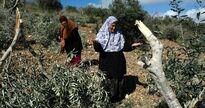
Israeli occupation forces (IOF) used military bulldozers to raze Palestinian cultivated land lots in Beit Jala to the west of Bethlehem on Monday.
Owner of the land Walid Zireina said that the IOF soldiers broke into his and his brother’s land and bulldozed the four-dunum land lot, noting that Israeli municipality teams were in the company of the soldiers.
He pointed out that the bulldozing cut off dozens of olive trees, noting that the land included at least 200 olives trees.
He said that the IOF declared the area a closed military zone and arrested his brother Ayman, who was in his land during the process.
Owner of the land Walid Zireina said that the IOF soldiers broke into his and his brother’s land and bulldozed the four-dunum land lot, noting that Israeli municipality teams were in the company of the soldiers.
He pointed out that the bulldozing cut off dozens of olive trees, noting that the land included at least 200 olives trees.
He said that the IOF declared the area a closed military zone and arrested his brother Ayman, who was in his land during the process.

Israeli occupation navy opened its fire Monday morning towards Palestinian fishermen off Gaza northern coast.
The committee in charge of documenting Israeli violations against Palestinian fishermen reported that the Israeli navy opened fire toward fishermen along the northern Gaza coast; no causalities were reported.
It was also reported that the navy was firing on Palestinian boats for all of last night.
The Israeli occupation navy engages in daily attacks against fishermen off Gaza Strip coast, under the pretext that they have exceeded the allowed fishing zone.
The committee in charge of documenting Israeli violations against Palestinian fishermen reported that the Israeli navy opened fire toward fishermen along the northern Gaza coast; no causalities were reported.
It was also reported that the navy was firing on Palestinian boats for all of last night.
The Israeli occupation navy engages in daily attacks against fishermen off Gaza Strip coast, under the pretext that they have exceeded the allowed fishing zone.
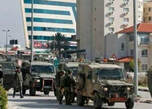
Israeli soldiers abducted, on Monday at dawn, twenty-one Palestinians from their homes, in several parts of the occupied West Bank, including occupied East Jerusalem.
One of the abducted Palestinians is the head of the Jerusalem office of the Palestinian Prisoners’ Society and the secretary of Fateh movement in the city.
The PPS said the soldiers abducted Nasser Qous, the head of its office in Jerusalem and the secretary of Fateh movement in the city, after storming and searching his home in the Old City.
It added that the soldiers also abducted Nasser Salama, Emad Shalloudi and Haitham Hijazi, in the Old City of Jerusalem, and Ayman ar-Resheq from the ath-Thouri neighborhood in Silwan town.
In addition, the soldiers abducted Majdi Hashshash, Yousef Ahmad al-Ashqar, Yousef Amjad al-Ashqar, Abdullah Shehada, Yousef Ali Shehada, Saifeddin Safadi and Mohammad Safadi, from their homes in Nablus governorate, in northern West Bank.
In Bethlehem, south of Jerusalem, the soldiers abducted four Palestinians, identified as Rabea’ Salah Taqatqa, Ahmad Salah Taqatqa, Essam Mohammad Taqatqa and Karim Sameeh Taqatqa.
In Jenin, in northern West Bank, the soldiers abducted Osama Ayman ‘Aabed, Ehsan Ayman ‘Aabed and Omar Fadel Jad’oun.
In Tulkarem, also in northern West Bank, the soldiers abducted Mohammad Ra’ed al-Hawarin, from his home.
In addition, the soldiers abducted Taiseer Ahmad al-Jondi, 60, and a former political prisoner who was held by Israeli for fifteen years, identified as Zaher Abdulrahman Doqqa, 42.
In related news, Israeli soldiers, stationed in Nahal Oz military base, across of perimeter fence, east of Gaza city, fired many live rounds at Palestinian farmers, on their lands, east of the Sheja’eyya neighborhood, east of Gaza city, forcing them to leave.
One of the abducted Palestinians is the head of the Jerusalem office of the Palestinian Prisoners’ Society and the secretary of Fateh movement in the city.
The PPS said the soldiers abducted Nasser Qous, the head of its office in Jerusalem and the secretary of Fateh movement in the city, after storming and searching his home in the Old City.
It added that the soldiers also abducted Nasser Salama, Emad Shalloudi and Haitham Hijazi, in the Old City of Jerusalem, and Ayman ar-Resheq from the ath-Thouri neighborhood in Silwan town.
In addition, the soldiers abducted Majdi Hashshash, Yousef Ahmad al-Ashqar, Yousef Amjad al-Ashqar, Abdullah Shehada, Yousef Ali Shehada, Saifeddin Safadi and Mohammad Safadi, from their homes in Nablus governorate, in northern West Bank.
In Bethlehem, south of Jerusalem, the soldiers abducted four Palestinians, identified as Rabea’ Salah Taqatqa, Ahmad Salah Taqatqa, Essam Mohammad Taqatqa and Karim Sameeh Taqatqa.
In Jenin, in northern West Bank, the soldiers abducted Osama Ayman ‘Aabed, Ehsan Ayman ‘Aabed and Omar Fadel Jad’oun.
In Tulkarem, also in northern West Bank, the soldiers abducted Mohammad Ra’ed al-Hawarin, from his home.
In addition, the soldiers abducted Taiseer Ahmad al-Jondi, 60, and a former political prisoner who was held by Israeli for fifteen years, identified as Zaher Abdulrahman Doqqa, 42.
In related news, Israeli soldiers, stationed in Nahal Oz military base, across of perimeter fence, east of Gaza city, fired many live rounds at Palestinian farmers, on their lands, east of the Sheja’eyya neighborhood, east of Gaza city, forcing them to leave.

Israeli channel 11 revealed, on Sunday, that the Israeli Finance Ministry, prior to the elections,had transferred NIS 660 million to Palestinian banks as an attempt to impose a fait accompli on the Palestinian Authority to accept the incomplete tax revenues.
In February, Israel decided to cut the sum of money which it collects on behalf of and passes to the PA, who distributes it, in salaries to employees and prisoner families.
The PA refused to accept the funds because Israel deducted the money allocated to families of the slain and prisoners, whom it calls terrorists.
The channel warned that the PA could be heading towards a collapse in economy, adding that Israeli Prime Minister Benjamin Netanyahu met with Minister of Finance Moshe Kahlon, to discuss ways to persuade the PA to accept the deductions.
PNN further notes that the cuts lead to a financial crisis, where the PA decided to pay its employees half of the salary and to reduce expenses, saying that Israel was waging a financial war by deducting money that is originally for the PA.
In February, Israel decided to cut the sum of money which it collects on behalf of and passes to the PA, who distributes it, in salaries to employees and prisoner families.
The PA refused to accept the funds because Israel deducted the money allocated to families of the slain and prisoners, whom it calls terrorists.
The channel warned that the PA could be heading towards a collapse in economy, adding that Israeli Prime Minister Benjamin Netanyahu met with Minister of Finance Moshe Kahlon, to discuss ways to persuade the PA to accept the deductions.
PNN further notes that the cuts lead to a financial crisis, where the PA decided to pay its employees half of the salary and to reduce expenses, saying that Israel was waging a financial war by deducting money that is originally for the PA.
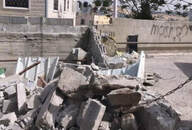
Israeli soldiers demolished, on Monday morning, a garage in Silwan town, south of the Al-Aqsa mosque, in occupied Jerusalem, and handed an order for the demolition of one home, the Wadi Hilweh Information Center in Silwan (Silwanic) has reported.
The soldiers invaded the ath-Thoury neighborhood in Silwan, and demolished a Garage, owned by Kamal Shweiki, reportedly for being built without a permit.
In addition, the soldiers invaded Wadi Qaddoum neighborhood, in Silwan, and handed a warrant to Mohammad Sa’id Salayma to complete the demolition of his home.
Silwanic said the Palestinian had to demolish his property several days ago, after receiving an order from the City Council, for building it without a permit.
Many Palestinians who receive demolition orders are forced to tear down their own homes and property in order to avoid further excessively high fees and fines that they incur when Israel demolishes their homes and bills them for the expenses.
While Israel continues to build and expand its illegal colonies in occupied Palestine, in direct violation of International Law, the Fourth Geneva Convention and various international resolutions, the Palestinians in and around east Jerusalem, and the rest of Area C (%61 the occupied West Bank), continue to be largely denied construction permits, in addition to the excessively high costs of the applications.
The soldiers invaded the ath-Thoury neighborhood in Silwan, and demolished a Garage, owned by Kamal Shweiki, reportedly for being built without a permit.
In addition, the soldiers invaded Wadi Qaddoum neighborhood, in Silwan, and handed a warrant to Mohammad Sa’id Salayma to complete the demolition of his home.
Silwanic said the Palestinian had to demolish his property several days ago, after receiving an order from the City Council, for building it without a permit.
Many Palestinians who receive demolition orders are forced to tear down their own homes and property in order to avoid further excessively high fees and fines that they incur when Israel demolishes their homes and bills them for the expenses.
While Israel continues to build and expand its illegal colonies in occupied Palestine, in direct violation of International Law, the Fourth Geneva Convention and various international resolutions, the Palestinians in and around east Jerusalem, and the rest of Area C (%61 the occupied West Bank), continue to be largely denied construction permits, in addition to the excessively high costs of the applications.
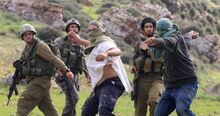
Three Palestinians were injured on Sunday evening after Israeli settlers attacked them in Ras Karkar village, west of Ramallah.
Activist Rateb Abu Rahma said that the injured are Mohammed al-Dik, 53, Osama Matar, 49, and Zahid Eshtayya, 42.
Abu Rahma said that a group of Israeli settlers attacked the three Palestinians during their work in a land in Jabal al-Risan area, assaulted them, and hurled rocks at them.
The injured men suffered bruises and different wounds and were taken to Palestine Medical Complex in Ramallah for treatment.
The Israeli occupation is seeking to seize the Palestinian lands of Jabal al-Risan because of its strategic location, with the aim of linking several existing settlements and separating Ramallah villages from each other.
Activist Rateb Abu Rahma said that the injured are Mohammed al-Dik, 53, Osama Matar, 49, and Zahid Eshtayya, 42.
Abu Rahma said that a group of Israeli settlers attacked the three Palestinians during their work in a land in Jabal al-Risan area, assaulted them, and hurled rocks at them.
The injured men suffered bruises and different wounds and were taken to Palestine Medical Complex in Ramallah for treatment.
The Israeli occupation is seeking to seize the Palestinian lands of Jabal al-Risan because of its strategic location, with the aim of linking several existing settlements and separating Ramallah villages from each other.
28 apr 2019
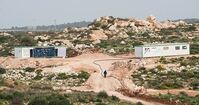
The Israeli occupation forces (IOF) has issued a military decree giving itself the right to annex 401 dunums of land from Palestinian areas in al-Khalil to build a bypass for Jewish settlers.
Palestinian official Jamal al-Omla, from the Land Research Center, said that the annexed land is located in Beit Ummar town, Halhul town, Beit Kharf hamlet, Ras al-Qadi area and al-Darji hamlet.
Omla warned that this road would have serious repercussions for the local residents in the entire area, adding that the road would go through Palestinian lands and homes and would lead to the destruction of agricultural plots of land and houses.
Palestinian official Jamal al-Omla, from the Land Research Center, said that the annexed land is located in Beit Ummar town, Halhul town, Beit Kharf hamlet, Ras al-Qadi area and al-Darji hamlet.
Omla warned that this road would have serious repercussions for the local residents in the entire area, adding that the road would go through Palestinian lands and homes and would lead to the destruction of agricultural plots of land and houses.
26 apr 2019
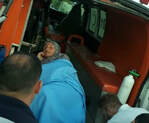
Israeli soldiers and illegal colonialist settlers attacked, Friday, dozens of Palestinian farmers on their lands, east of Yatta town, south of the southern West Bank city of Hebron, and attempted to abduct a young man, before shooting an elderly woman with a gas bomb, and caused dozens to suffer the effects of teargas inhalation.
Rateb Jabour, the coordinator of the Popular and National Committees in Southern West Bank, said the soldiers shot Khadra Salman Rib’ey, 70, with a gas bomb in her chest, before she was moved to a local hospital.
He added that the incident took place after dozens of illegal colonists tried to invade the at-Tiwana village east of Yatta, and attacked many farmers on their own lands, before the Israeli soldiers also attacked the villagers and started firing gas bombs at them.
The Israeli attacks took place as the farmers were harvesting their lands, and the soldiers also attempted to abduct a young man, but he managed to run away.
Rateb Jabour, the coordinator of the Popular and National Committees in Southern West Bank, said the soldiers shot Khadra Salman Rib’ey, 70, with a gas bomb in her chest, before she was moved to a local hospital.
He added that the incident took place after dozens of illegal colonists tried to invade the at-Tiwana village east of Yatta, and attacked many farmers on their own lands, before the Israeli soldiers also attacked the villagers and started firing gas bombs at them.
The Israeli attacks took place as the farmers were harvesting their lands, and the soldiers also attempted to abduct a young man, but he managed to run away.
